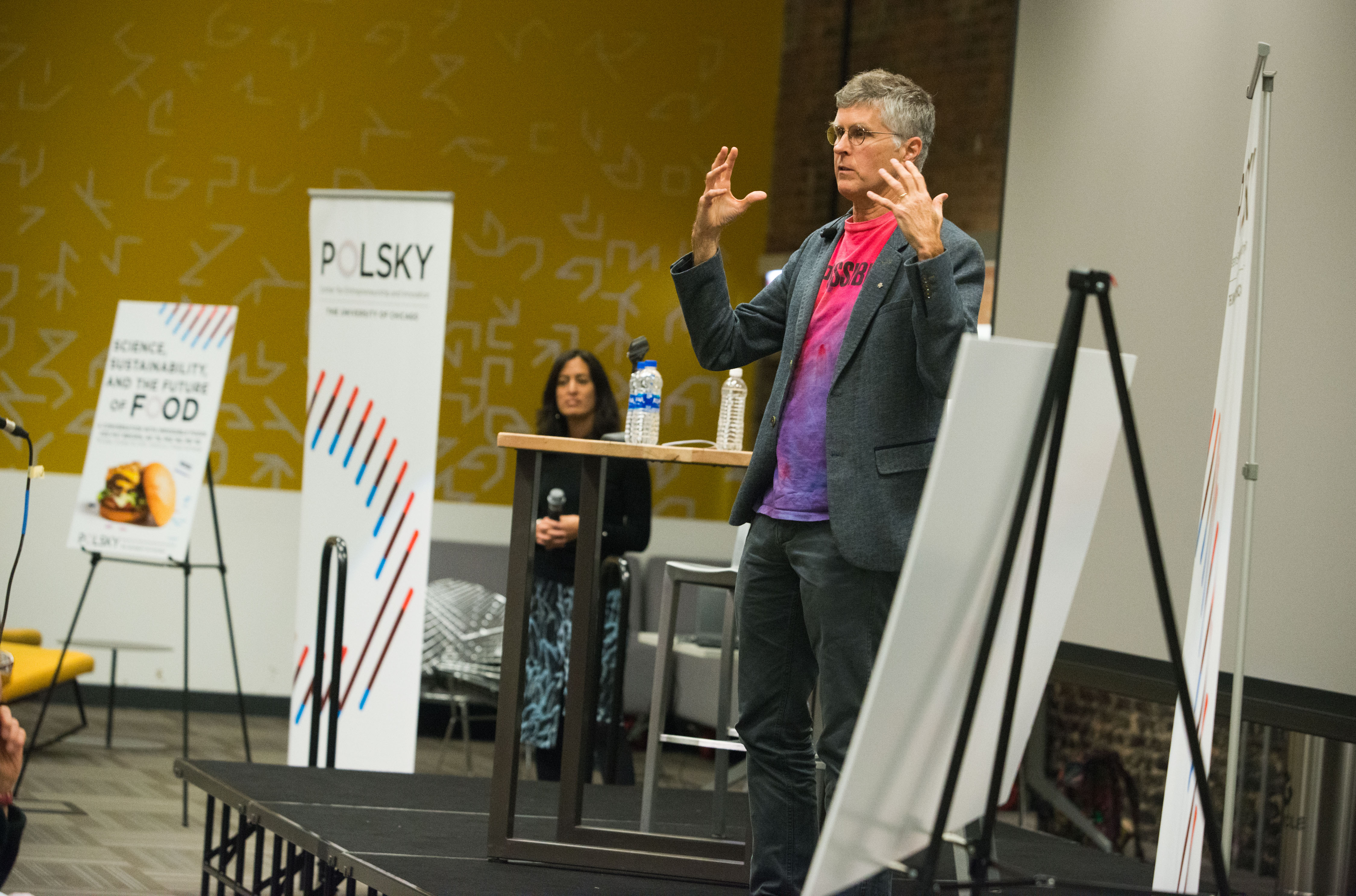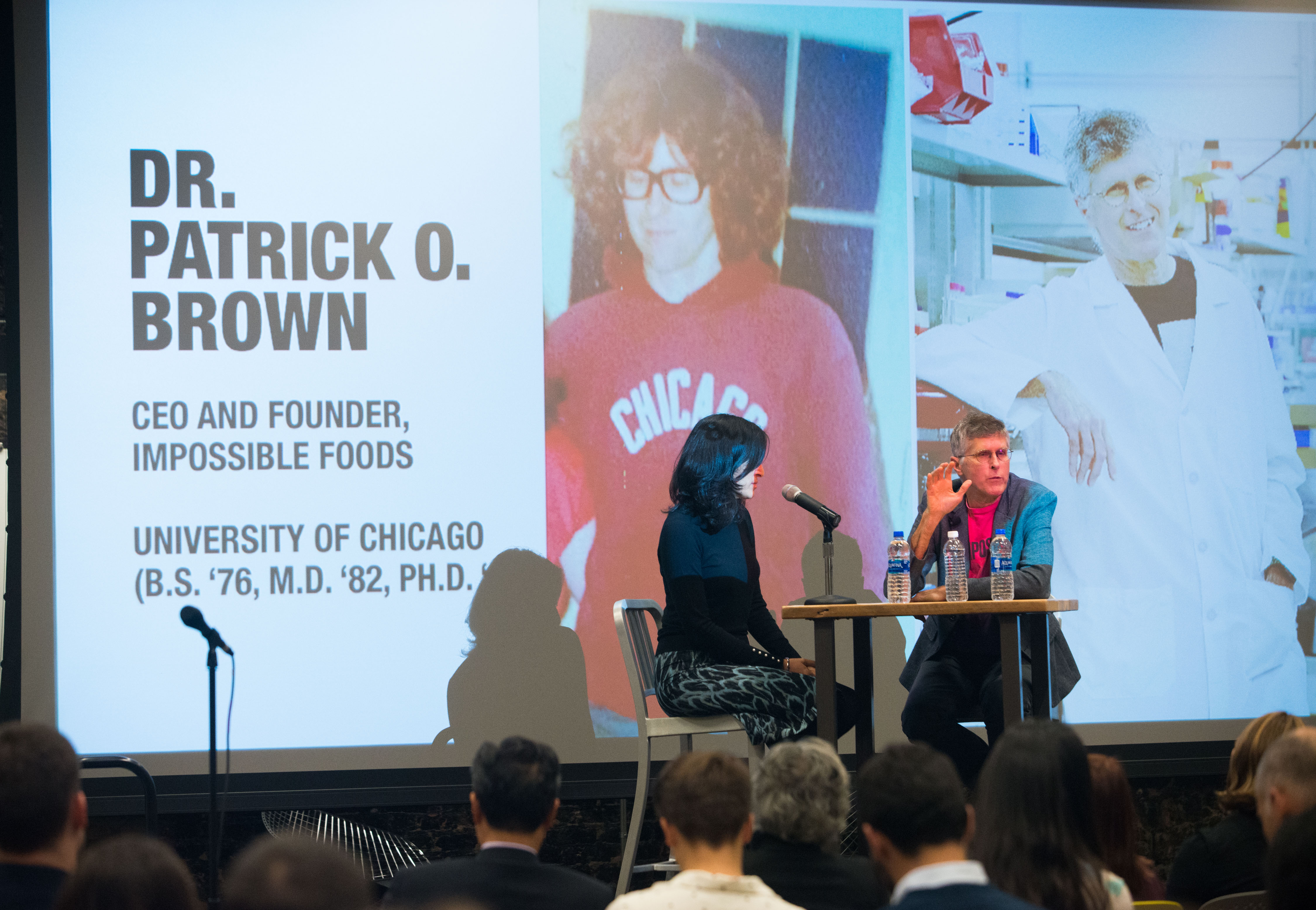
By Sophia Wagner and Caitlin Piccirillo-Stosser
Last Thursday, the Frizzell Learning and Speaker Series, in conjunction with the Polsky Exchange and UChicago Medicine, hosted “Science, Sustainability, and the Future of Food: A Conversation with Impossible Foods CEO Pat Brown.” This event provided a thought-provoking examination of the beef industry and a peek into what the future could hold. It was especially interesting to learn about the career path of a UChicago alumnus; Dr. Brown holds a BA in Chemistry, a PhD in Biochemistry, and a MD from the University of Chicago.
At the beginning of the event, the audience’s attention was captured with a short film titled “For the Love of Meat.” Despite the playful style and animated pictures, Dr. Brown revealed some stark facts about global meat production. Cows outweigh every living wild mammal by a factor of 10. Every day, the amount of water used in animal farming could fill San Francisco Bay. The Impossible Burger is offered as the solution: a meatless alternative made from a genetically-engineered heme protein, along with wheat protein, potato protein, and coconut oil.
Compared to a conventional beef burger, the Impossible Burger uses “1/20th the land, 1/4th the water, and produces 1/8th the greenhouse gas emissions.” In more tangible terms, replacing a beef burger with an Impossible Burger causes a carbon footprint reduction equivalent to forgoing 17 miles of driving in the typical US car. As an economics student, I’m a big fan of quantifying social and environmental problems, so it was great to hear cross-industry comparisons about sustainability choices.
Even with these impressive reductions, Dr. Brown noted in discussion that Impossible Foods is ever-committed to improving their products and environmental impacts. Currently, the burger is not sold in grocery stores or online. When questioned about the limited availability of the burger, Dr. Brown noted that launching solely in restaurants provides the advantage of guaranteeing the burger is prepared properly by a trained chef.
As reiterated by multiple members of the Impossible Foods team, the environmental impact of animal farming isn’t talked about enough. Fuel efficiency, electric cars and solar panels are prevalent topics in conversations about sustainability. The innovation prevalent in other industries isn’t matched when it comes to food production. Dr. Brown feels that using animal technology for food production is arcane and a problem worth tackling.
As Dr. Brown emphasized several times during the discussion, Impossible Foods is determined to completely eliminate animals as meat technology by 2035, and the company truly believes this goal is feasible. At our meeting with Dr. Brown before the event itself, we discussed how many people “want to do the right thing.” A majority of people understand the issues with the meat industry, including the maltreatment of animals, the addition of antibiotics, and the numerous environmental consequences that result, but the reality of the situation is that humans love meat. Changing our diets and our taste preferences can’t be the solution, because it simply will not happen. That’s where Impossible Foods comes in. They believe that the only way to reduce our dependence on animals for food production, especially for meat, is to make sure that people don’t have to make any compromises with regard to their preferences. The meat has to be just as delicious, just as nutritious, and just as affordable, so Impossible Foods will continue to innovate and improve their Impossible Burger until it is a perfect substitute to which people can make the shift.
Dr. Brown assured both the smaller Frizzell group and the much larger audience that Impossible Foods is only going to keep expanding and growing over the next several years. While they currently have locations in New York, California, Texas, Florida, and the Midwest, among others, they will continue to open additional locations for the Impossible Burger across the country. The company is also looking to do its first small-scale launch outside the United States in 2018. In addition to opening new locations, Impossible Foods is hoping to develop and launch other meat alternatives, such as turkey and chicken, in the near future.
Whether by 2035 or by some other date in the near or far future, meat production from animals will certainly decrease worldwide, as healthy and tasty alternatives such as the Impossible Burger continue to arise and spread. The exact path toward “2035” may be uncertain, but it is certain that change will occur, otherwise we will be dealing significant climate change impacts and serious inefficiencies for our economy. We look toward Impossible Foods, the Impossible Burger, and other initiatives for driving the movement in the right direction.
The Frizzell Committee is very excited for this year, as we commemorate the life, accomplishments, and aspirations of Alexandra Frizzell by continuing to organize exciting programming that engages the fields of agriculture, health, and the environment. We are so honored to have hosted Dr. Brown and Impossible Foods for our first event, and be sure to check back soon for updates on our upcoming events!
1. https://www.impossiblefoods.com/faq/







